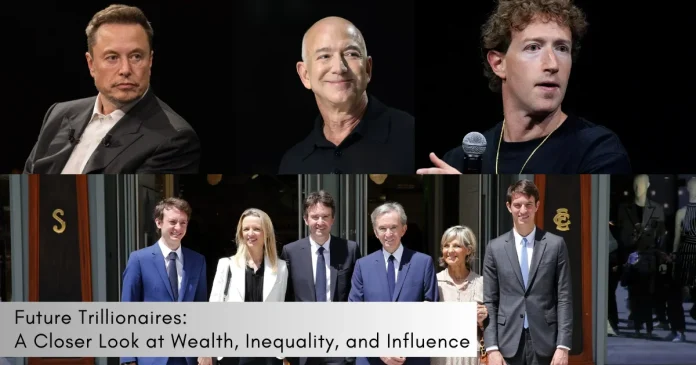Move over billionaires; the world is now preparing for the future trillionaires. Yes, you read that right! If current trends persist, some of today’s wealthiest individuals may cross the unimaginable milestone of $1 trillion in personal net worth within the next decade. While this sounds incredible, it also raises serious questions about inequality, wealth distribution, and the growing influence of the super-rich on global politics and economics.
So, who are these future trillionaires, and what does their rise mean for the rest of us? Let’s break it down in simple terms.
Who Are the Future Trillionaires?
According to Oxfam’s annual inequality report, five individuals are poised to hit the trillion-dollar mark in wealth:
- Elon Musk: The Tesla and SpaceX CEO is already the world’s richest person with a net worth of over $430 billion. If his wealth continues to grow at the current rate, he could become the first trillionaire in just under five years.
- Jeff Bezos: The Amazon founder may have stepped down as CEO, but his investments and holdings keep his wealth surging.
- Larry Ellison: The Oracle founder is another name that is expected to join the trillionaire club.
- Mark Zuckerberg: Meta’s CEO has faced his share of controversies, but his wealth remains on a steep upward trajectory.
- Bernard Arnault and Family: The CEO of LVMH (the luxury goods giant) represents the world of high-end fashion and retail on this list.
These individuals’ fortunes are built on technology, retail, and luxury goods, sectors that have seen massive growth in recent years.

Future Trillionaires: How Did We Get Here?
The future trillionaires is a complex phenomenon shaped by various interacting factors.
A Soaring Stock Market
2024 was a banner year for the wealthy, with the U.S. stock market reaching record highs. Billionaires collectively saw their wealth grow by a staggering $2.1 trillion last year, with their net worth increasing three times faster than in 2023.
Inherited Wealth
Interestingly, more billionaires now inherit their fortunes than build them from scratch. Oxfam’s report, titled Takers Not Makers, highlights that over one-third of billionaire wealth stems from inheritance. In fact, in 2023, all 17 billionaires under 30 inherited their wealth.
Global Wealth Distribution
While the world’s billionaires enjoyed exponential growth in their net worth, poverty levels have stagnated. The number of people living in poverty remains roughly the same as in 1990, emphasizing the growing gap between the rich and the poor.
Implications of Trillionaires on Society
The idea of a future trillionaire isn’t just mind-boggling; it has profound implications for society, politics, and the global economy.
Wealth Inequality
To put $1 trillion into perspective: If you spent $1 every second, it would take you over 31,000 years to spend $1 trillion. This level of wealth accumulation is hard to fathom and raises ethical questions about inequality.
| Statistic | Figure |
| Billionaires worldwide | 2,770 |
| Total wealth of billionaires | $15 trillion |
| Billionaires in the U.S. | 816 |
| Growth in billionaire wealth | $2.1 trillion in 2024 |
Political Influence
The wealthy aren’t just sitting on their money; they’re using it to shape policies. For instance, Elon Musk reportedly contributed over $260 million to Donald Trump’s 2024 campaign and is now a key advisor in the U.S. government. This growing influence of the super-rich in politics is both fascinating and concerning.
Tax Evasion and Loopholes
Many countries, including the United States, have weak inheritance tax laws. Wealthy families use legal loopholes to avoid paying significant taxes, further widening the wealth gap. This has led to calls for reforms to ensure fair taxation.
What Can Be Done?
Oxfam’s report doesn’t just present the problem; it also suggests solutions. Here are some steps governments and policymakers could take:
Tax Reform
Introduce or strengthen inheritance taxes and close loopholes that allow the wealthy to evade taxes. This could help fund public services and reduce inequality.
Wealth Redistribution
Encourage philanthropy and ensure that the ultra-rich contribute to society by funding healthcare, education, and infrastructure projects.
Transparency in Politics
Implement stricter regulations on campaign financing to limit the influence of billionaires on political decisions.
Read more on: Future Trillionaires
The Ethical Debate: Is Trillionaire Status Fair?
While some celebrate the future trillionaires as a testament to human innovation and success, others see it as a symbol of a broken economic system. The truth likely lies somewhere in the middle.
- On one hand, these individuals create jobs, drive technological advancements, and contribute to the global economy.
- On the other hand, extreme wealth concentration threatens democracy, fairness, and social mobility.
You might also like: Negative Impact of Smartphones on Your Child’s Mental Health. Help Them This 2025
FAQs
1. Who will likely be the first trillionaire?
Elon Musk is expected to become the world’s first trillionaire within the next five years, according to current projections.
2. How is billionaire wealth growing so fast?
Factors like a booming stock market, weak inheritance tax laws, and rapid technological advancements contribute to the exponential growth of billionaire wealth.
3. Why is wealth inequality a concern?
Extreme wealth concentration can lead to political and economic imbalances, making it harder for average citizens to access opportunities and resources.
4. What can governments do to address this issue?
Governments can implement tax reforms, close loopholes, and regulate political campaign financing to ensure fair wealth distribution.
The rise of trillionaires is undoubtedly a significant milestone in human history. However, it’s also a wake-up call to address the systemic issues that allow such extreme wealth accumulation. By understanding the dynamics at play, we can work toward a fairer and more equitable future for everyone. Follow our Odyssey page for more such articles.


